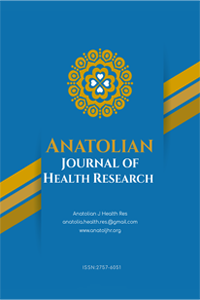Hemşirelerin vicdan algılarının bakım verici rollerine ilişkin tutumlarına etkisi
bakım, vicdan, hemşirelik
The effect of nurses' perceptions of conscience on their role as caregivers
care, conscience, nursing,
___
- Adıgüzel, O., Tanrıverdi, H., & Özkan, D. S. (2011). Occupational professionalism and the case of nurses as members of a profession. Journal of Management Sciences, 9(2), 237-257.
- Aksoy, S. D., Mert, K., & Çetin, İ. (2019). Turkish validity and reliability of the Perception of Conscience Scale in Nurses. Manisa Celal Bayar University Journal of Health Sciences Institute, 6(3), 148-153.
- Ahern, K., & McDonald, S. (2002). The beliefs of nurses who were involved in a whistle blow ingevent. Journal of Advanced Nursing, 38, 303-309. https://doi.org/10.1046/j.1365-2648.2002.02180.x
- Bakır, H. (2019). The relationship between the professional values of nurses and their caregiver roles. (Unpublished master's thesis). University of Selçuk, Konya.
- Bayraktar, D., & Eşer, İ. (2017). Attitudes and behaviors of nurses towards caring nurse-patient interaction. Anatolian Journal of Nursing and Health Sciences, 20(3), 188-194.
- Burkhardt, M. A., & Nathaniel, A. K. (2008). Ethics issues in contemporary nursing. London: Delmar Cengage Learning.
- Carbone, S., Rickwood, D., & Tanti, C. (2011). Work force shortages and their impact on Australian youth, mental health service reform. Advances in Mental Health, 10, 92–97. https://doi.org/10.5172/jamh.2011.10.1.92
- Çulha, Y., & Acaroğlu, R. (2018). The relationship amongst student nurses’ values, emotional intelligence and individualised care perceptions. Nursing Ethics, 1-11. https://doi.org/10.1177/0969733018796682
- Dahlqvist, V., Eriksson, S., Glasberg, A. L., Lindahl, E., Lützén, K., Strandberg, G., Söderberg, A., Sorlie, V., & Norberg, A. (2007). Development of the Perceptions of Conscience Questionnaire. Nursing Ethics, 14, 181–193. https://doi.org/10.1177/0969733007073700
- Davis, A., Davidson, B., Hirschfeld, M.,Lauri, S., Lin, J. Y., Norberg, A., Philips, L., Pitman, E., Shen, C. H., Laan, V., Zhang, H. L., & Ziv, L. (1993). An international perspective of active euthanasia: attitudes of nurses in seven countries. International Journal of Nursing Studies, 30, 301-310. https://doi.org/10.1016/0020-7489(93)90102-z
- Idvall, E., Berg, A., Katajisto, J., Acaroglu, R., Antunes da Luz, M., Efstathiou, G., Kalafati, M., Nevin, K., Leino-Kilpi, H., Lemonidou, C., Papastavrou, E., Sendir, M., & Suhonen, R. (2012). Nurses’ Socio demographic background and assessments of individualized care. Journal of Nursing Scholarship, 44(3), 284-293. https://doi.org/10.1111/j.1547-5069.2012.01463.x
- International Council of Nurses, ICN (2012). The ICN Code of Ethics for Nurses. https://www.icn.ch/sites/default/files/inlinefiles/2012_ICN_Codeofethicsfornurses_%20eng.pdf
- Johnstone, M. J. (2019). Bioethics: a nursing perspective. Elsevier Health Sciences. 6th ed. Australia.
- Juthberg, C., Eriksson, S., Norberg, A., & Sundin, K. (2007). Perceptions of conscience in relation to stress of conscience. Nursing Ethics, 14(3), 329-343. https://doi.org/10.1177/0969733007075868
- Kalı, S. D. (2019). Investigation of attitudes of nurses working in a state hospital towards their caregiver roles. (Unpublished master's thesis). University of Atatürk, Erzurum.
- Koçak, C., Albayrak, S. A., & Duman, N. B. (2014). Developing an Attitude Scale for Nurses in Caregiving Roles: validity and reliability tests. Journal of Education and Research in Nursing, 11, 16-22.
- Korkmaz, E., & Korkut, S. (2021). The COVID-19 pandemic and moral distress. Turkish Journal of Bioethics, 8(1), 3-10.
- Memarian, R., Salsali, M., Vanaki, F., Ahmadi, F., Hajizadeh, A. (2007). Effective factors in the process of achieving clinical competency. Scientific Journal of Zanjan University of Medical Sciences, 14(56), 40-49.
- Mesler, M. A. (2000). Hospice and assisted suicide: the structure and process of inherent dilemma. Death Studies, 24(2), 135-155. https://doi.org/10.1080/074811800200612
- Norberg, A., Hirschfeld, M., Davidson, B., Davis, A., Lauri, S., Lin, J. Y., Philips, L., Pitman, E., Laan, V., & Ziv, L. (1994). Ethical reasoning concerning the feeding of severely demented patients: an international perspective. Nursing Ethics, 1(1), 3-13. https://doi.org/10.1177/096973309400100102
- Post, I. (1998). Perioperative nurses’ encounter with value conflicts: a descriptive study. Scandinavian Journal of Caring Sciences, 12(2), 81-88. https://doi.org/10.1111/j.1471-6712.1998.tb00480.x
- Ricoeur, P. (1994). Oneself as another. University of Chicago Press.
- Shonen, R., Gustafsson, M. L, Katajisto, J., Välimäki, M., & Leino‐Kilpi, H. (2010). Nurses’ perceptions of individualized care. Journal of Advanced Nursing, 66(5), 1035-1046. https://doi.org/10.1111/j.1365-2648.2009.05256.x
- Sulmasy, D. P. (2008). What is conscience and why is respectfor it so important? Theoretical Medicine and Bioethics, 29(3), 135–149. https://doi.org/10.1007/s11017-008-9072-2
- Sørlie, V., Jansson, L., & Norberg, A. (2003). The meaning of being in ethically difficult care situations in paediatric care as narrated by female registered nurses. Scandinavian Journal of Caring Sciences, 17(3), 285-292. https://doi.org/10.1046/j.1471-6712.2003.00229.x
- Tan, M., Yuncu, S., Şentürk, Ö., & Yıldız, Ö. (2007). University students' perspectives on nursing. Journal of Atatürk University School of Nursing, 10(1), 22-39
- Tazakori, Z., Mozafari, N., Movahedpour, A., Mazaheri, E., Karim Elahi, M., & Mohamadi, M. A. (2005). Comparison of nursing students and instructors about OSPE performance and evaluation methods in common practice. In Proceedings of the 7th National Congress Country Training (Vol. 9).
- Toulmin, S. (2017). The tyranny of principles. In Ethics and Medical Decision-Making (pp. 193-201). Routledge.
- Wilkinson, J. M. (1987). Moral distress in nursing practice: experience and effects. Nursing Forum, 23(1), 16-29.
- Yılmaz, D. U., Dilemek, H., Yılmaz, D., Korhan, E. A., Çelik, E., & Rastgel, H. (2017). Attitudes and related factors for nurses in caregiving roles. International Refereed Journal of Nursing Research, 1, 83-97.
- Başlangıç: 2020
- Yayıncı: TUBA UÇAR
Hemşirelerin vicdan algılarının bakım verici rollerine ilişkin tutumlarına etkisi
Ümmühan AKTÜRK, Mehmet CAN, Sinem AYTOP
Adem Emrah COĞUPLUGİL, Sercan YILMAZ, Turgay EBİLOĞLU, Selcuk SARIKAYA, Doğucan Nuri UĞUR, Bahadır TOPUZ, Mesut GURDAL
Yaşlıda düşme riskini tahmin etmede osteosarkopeni ve dengenin rolü
Funda DATLI YAKARYILMAZ, Neslihan CANSEL
Aynur AYTEKİN ÖZDEMİR, Ayşe OKANLI, Nesrin İLHAN, Rujnan TUNA, Hacer ATAMAN, Cemile SAVCI, Berna DİNÇER, Rabia Aleyna ÇATAL, Emine BARBAROS
Mehmet KAPLAN, Zeynep GÜNGÖRMÜŞ
Paramedik öğrencilerinin kaygı düzeyleri ile yaşam nedenleri arasındaki ilişki
Mehmet KAPLAN, Müjde KERKEZ, Tülay ÇETKİN
Ebe ve hemşirelerde COVID-19 fobisinin hasta bakım davranışına etkisi
Nurten ÖZÇALKAP, Semiha AYDIN ÖZKAN, Sevda TAŞTAN, İbrahim Hakan BUCAK
Güncel bilgiler doğrultusunda 0-5 yaş grubu ateşli çocuğa yaklaşım: Geleneksel derleme
10 cm'den büyük böbrek hücreli kanserli hastaların klinik ve histopatolojik özellikleri
